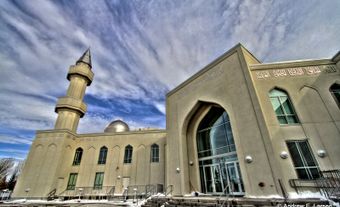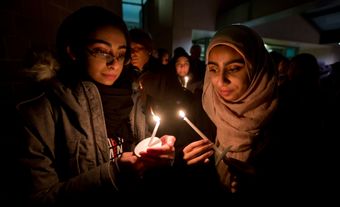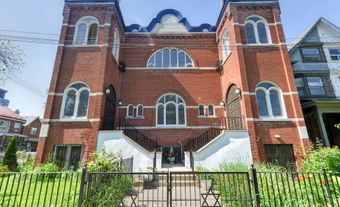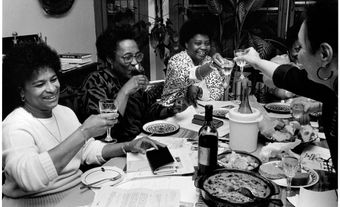As of the 2016 census, there were 103,940 people of Moroccan origin living in Canada, of whom 85,940 lived in Quebec. Thus about 82.6% of all Moroccans in Canada lived in the majority francophone province.
Moroccan Immigration to Canada
The first cohort of Moroccan immigrants began arriving in Canada in the 1950s. Most of them were Jews fleeing Morocco after the French protectorate ended and the country became independent in 1956. Immigration of Moroccan Jews to Canada rose again during the Arab-Israeli wars, in particular the Six Day War in 1967. Most members of this wave of immigration, which continued until about 1980, settled in Quebec.
With the opening up of Canadian immigration policy in the late 1960s, residents of countries such as Morocco were able to immigrate to Canada more easily. Ottawa (see Federal Government) no longer selected immigrants according to their origin, but rather according to their work and language skills, their education and their family ties.
Expo 67 put Quebec in the international spotlight and attracted people from all over the world, including Maghreb. Moroccan tourists and a large Moroccan delegation composed of 10 dignitaries travelled to Montreal for the occasion. After Expo 67 was over, many students, business people and artists from Maghreb flocked to the province.

The first Muslim immigrants from Morocco began arriving in Canada in the 1970s. In the late 1990s, immigration from Morocco intensified. The majority of these immigrants were Muslims who, facing worsening social and economic conditions at home and denied entry to Europe, headed for Quebec, and in particular for Montreal.
In addition, in 1979, Quebec and Rabat (Morocco’s capital) signed an agreement that made it easier for Moroccan students to get permission to study in Quebec and reduced the tuition fees that they paid to do so. In 2018, the Canadian federal government introduced the Student Direct Stream, a program that let students obtain their study permits faster if they met certain conditions, including having $10,000 on deposit.
Over the years, the Quebec government gradually gained more control over immigration to the province. With the Canada-Québec Accord of 1991, Quebec acquired the right to select and manage economic immigration programs (see Quebec Immigration Policy), while family reunification and humanitarian immigration remained in the federal purview (see Canadian Refugee Policy). Quebec took advantage of these changes to give priority to immigrants who were young, educated and, most important, francophone, and immigrants from Morocco met all three of these criteria. According to the 2011 National Household Survey, 96% of the people of Maghrebian origin living in Quebec spoke French.
The members of the Moroccan community in Canada, in addition to being mostly francophone, young and educated, have high levels of work experience, since most of them are admitted as economic immigrants. The Moroccans who settle in Canada vary in their religious backgrounds, their degrees of religious observance and the language that they speak, along with other characteristics of their identities.
Since the year 2000, immigration from Morocco to Canada has continued to grow. Policies and arrangements accelerated Moroccan immigration to Quebec so much that, according to Quebec government statistics, when all immigrants admitted to the province from 2008 to 2012 were classified by country of birth, Morocco accounted for the second highest number — 9.5 per cent, just behind Algeria, with 9.6 per cent. In the following years, the number of Moroccan immigrants declined, so that Morocco ranked only 8th as country of birth for the period 2015 to 2019. In 2018, after having planned to do so for nearly 15 years, the Quebec government established an official office in the Moroccan capital of Rabat — its only office in North Africa.
Integration
While these supportive measures increased Moroccan immigration to Canada, once Moroccans and other people of Maghrebian origin arrived in Canada, even though they had been selected for their education and job experience, they faced the problem of refusal to recognize degrees earned and skills and work experience acquired abroad. As a result, many of these immigrants were forced to take often lower-paying jobs in other fields, or to go back to school.
At the same time, starting in the early 2000s, the social climate around issues of religion, identity, and immigration grew tenser in Quebec (see: 9/11 and Canada; Islamophobia in Canada; Secularism in Quebec); xenophobia increased.
As a result, in 2008, the unemployment rate for people of Maghrebian origin who had arrived in Quebec less than five years ago reached a record 27.9%. In comparison, at that same time, the unemployment rate was 17.4% for all immigrants who had arrived in Quebec less than five years ago and 5.5% for all residents of Quebec who had been born there.
In the rest of Canada as well, the rate of unemployment is higher for people from Maghreb than for the Canadian population as a whole. In 2016, the unemployment rate for Moroccans in Canada was 12.3%, compared with 7.3% for people who were not members of visible minorities. More broadly, in March 2022, Canadians of Arab origin had the second highest unemployment rate among all visible minorities: 8.2%. In contrast, the unemployment rate for the Canadian population as a whole was 5.3%.
Community, Cultural and Social Life
The Moroccan community in Canada has created many associations, organizations, and groups on social networks, concentrated mainly in Quebec. For example, many Moroccan schools have opened to offer courses in language, culture and religion. In 2009, the Congrès Maghrébin au Québec was founded to support the integration of people from Maghreb into Quebec society. In 2012, with the support of the Moroccan government, the Dar Al Maghrib Moroccan Cultural Centre opened its doors in Montreal — the first centre of its kind in North America.
In 2009, with the growing immigration of people from Maghreb to Quebec, the Petit Maghreb neighbourhood, in Montreal’s Saint-Michel district, was officially recognized by the city government. This neighbourhood includes many Maghrebian businesses, but only a small fraction of the city’s residents from Morocco and other Maghrebian countries live there.
Elsewhere in Canada, organizations such as the Moroccan Association of Toronto, Moroccan Jews in Canada, and Morocco House in Vancouver give Moroccans the chance to get together, support one another in their immigration and integration, and spread Moroccan culture in Canada.
There are also a number of Moroccan media outlets in Canada, such as the websites of Maghreb Canada Express and the Groupe Atlas Média.

 Share on Facebook
Share on Facebook Share on X
Share on X Share by Email
Share by Email Share on Google Classroom
Share on Google Classroom



